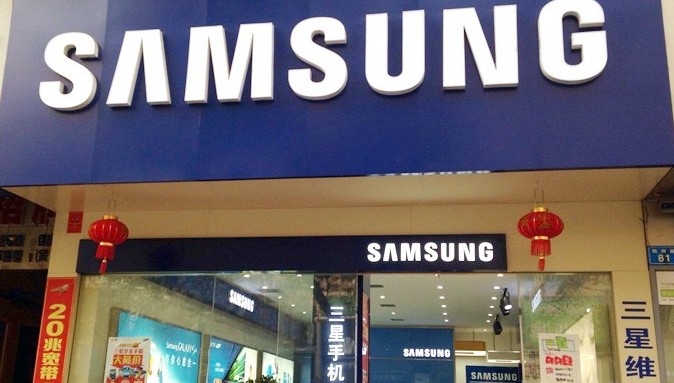(单词翻译:单击)
It was in 2010 that Lee Kun-hee, chairman of the Samsung group, warned that South Korea’s most famous company risked becoming a “corner shop”. In fact, at the time of his premonition, Samsung Electronics, by far the most profitable company in the sprawling Samsung empire, was on the verge of a golden streak.
三星集团(Samsung)董事长李健熙(Lee Kun-hee)在2010年曾警告说,这家韩国最著名的企业面临变成“街角小店”的风险。事实上,在他发出这一预警之际,三星电子(Samsung Electronics)——在庞大的三星集团内,最赚钱的就数三星电子——即将进入一段黄金时期。

It cemented its place as the world’s biggest technology company by sales, and as Asia’s most valuable brand, ahead of Japan’s Toyota, no less. It went on to become the first South Korean company to reach a market capitalisation of $200bn. Yet now, as 72-year-old Mr Lee lies gravely ill in a hospital bed following a heart attack, his paranoia looks almost prescient.
三星电子巩固了其作为销量最高的科技公司的地位,还超越日本丰田(Toyota),成为亚洲最有价值的品牌。然后它又成为第一家市值突破2000亿美元的韩国企业。然而,当72岁的李健熙因突发心脏病住进医院,重病在床,他当初的多疑现在看起来颇具先见之明。
Samsung Electronics is certainly no corner shop. It continues to dominate the country’s corporate landscape to an uncomfortable degree. Yet its problems are manifold and its horizons darkening. Last month it reported third-quarter profits down 60 per cent as margins on smartphones withered. Now, as it prepares for life after Mr Lee, who will be succeeded by his son, Lee Jae-yong, there is talk of a wholesale revamp. As if to rub salt in the wound, the market capitalisation of arch-rival Apple, whose third-quarter results were as rosy as Samsung’s were funereal, this week touched $700bn, more than four times that of the South Korean company today.
三星电子当然不是街角小店,它在韩国企业界依然独占鳌头,简直叫人心里不平。然而它也存在种种问题,前景日益黯淡。上个月三星电子公布了第三季度财报,由于智能手机业务的利润率萎缩,季度利润同比下滑60%。眼下,随着李健熙之子李在镕(Lee Jae-yong)将接替他掌管这家公司,有传言说三星电子要进行大调整。而三星电子主要竞争对手苹果(Apple)的三季度业绩颇为亮眼,更映衬三星业绩惨淡。苹果的市值在本周触及7000亿美元,比这家韩国企业当前市值多出三倍有余,无异于往三星的伤口上又撒了把盐。
What has gone wrong? Paradoxically, most of Samsung’s problems are down to its smartphones, the product for which it has become world renowned.
三星电子出了什么问题?自相矛盾的是,三星的问题多数都出在智能手机上,而其享誉全球也正是靠着智能手机。
At the premium end of the market, where handsets cost upwards of $500, its once-spirited challenge to Apple with its Galaxy smartphones has faded. The US company’s more stylish products command a higher premium and occupy an app-rich ecosystem that has proved far easier to turn into cash. Despite huge spending on marketing, Samsung has never managed to persuade consumers that its brand is as desirable as Apple’s. Nor is its generic Android operating system as easy to tailor as the proprietary iOS system. To top it all, Apple is now offering larger-screen phones, cancelling out Samsung’s biggest differentiating feature.
在售价高于500美元的高端手机市场,三星电子曾以Galaxy智能手机向苹果发起挑战,如今这股雄心已渐渐消失。苹果公司的产品更为时尚,定价也更高,而且这家美国企业还打造了一个拥有众多应用程序的生态系统,现实证明该系统更容易创造收益。尽管三星在营销上投入巨大,但从未成功说服消费者,让他们像渴望苹果那样去渴望三星。其通用的安卓操作系统也不像苹果自有的iOS系统那样易于定制。雪上加霜的是,苹果现在又提供大屏手机,这就抹掉了三星最大的差异化特征。
At the cheaper end of the market, too, Samsung’s advantages are fast evaporating. A crop of Chinese companies based in the fiercely competitive Shenzhen cluster, including Huawei, Xiaomi, Lenovo and ZTE, is robbing Samsung of volume and pricing power. In the second quarter of 2013, Samsung accounted for more than 32 per cent of global smartphone sales, according to research company IDC. By the third quarter of this year, that had shrivelled to less than 24 per cent. “Samsung is being squeezed at both ends,” says Benedict Evans, a partner at venture capital firm Andreessen Horowitz.
在较低端市场,三星的竞争优势也在迅速消失。华为(Huawei)、小米(Xiaomi)、联想(Lenovo)和中兴(ZTE)等一批中国公司都在抢夺三星的市场份额和定价权。市场研究公司IDC的数据显示,2013年二季度,三星智能手机出货量占全球的近三分之一;到今年三季度,这个数字已缩减为不到24%。风险投资公司Andreessen Horowitz的合伙人班尼迪克•埃文斯(Benedict Evans)表示:“三星在高低端两头受敌。”
At home, Samsung finds itself under pressure of a different kind. Many South Koreans take great pride in the company’s achievements. There is, however, also resentment at the dominance of Samsung and other chaebol conglomerates, which are seen to have benefited from government largesse and to have prospered by squeezing the little guy. Official policy is slowly catching up with public anger. From next year, a tax on retained earnings is likely to come into force. Other measures will cajole big companies into distributing more of their profits in wages and dividends.
在国内,三星则面临一种不同的压力。许多韩国人对三星的成功感到非常自豪。然而,人们对三星和其他大企业所占据的优势地位也感到愤愤不平,觉得这些大企业受到了政府的照顾和扶持,是通过挤压小企业的生存空间才兴旺起来的。政府政策也在逐渐呼应民怨。从明年起,韩国政府将开征一项留存收益税,并将采取其他措施,引导大企业通过工资和分红的方式将利润更多地分配出去。
One might conclude Samsung’s best days are behind it. Certainly, the transition to the third generation of Lee family control will be testing. The group is in the process of an upheaval that some put down to an attempt by the family to reduce inheritance tax. That may be so, but spin-offs could also result in a simpler, more investor-friendly structure.
有人或许会认为,三星的黄金时期已经过去。当然,管理权向李氏家族第三代的过渡将是一次考验。该集团正在经历一场剧变,一些人将这场剧变归结为李氏家族试图减少遗传税的努力。这么说或许没错,但拆分业务也可能造就一种更简明、更有利于投资者的公司结构。
On the operational front, the position may not be quite as grim as it appears. The company has culled its smartphone range, a strategy that should bring economies of scale as well as simplification. Samsung makes more than 320m smartphones a year and has a market share nearly five times that of Xiaomi, its nearest Chinese rival. That means it ought to be able to go head-to-head on price, particularly as it steps up its big manufacturing operations in low-cost Vietnam.
在运营方面,形势或许并不像表面看上去的那么严峻。三星已经削减了旗下智能手机的种类,这一策略应该会带来规模优势和简化效应。三星智能手机的年产量超过3.2亿部,市场份额比最接近自己的中国竞争对手小米大了近4倍。这意味着三星应该打得起价格战,特别是它已在成本较低的越南进一步扩大了生产规模。
Mark Newman, an analyst at Bernstein Research, says the worst could even be over for Samsung’s handset business. He predicts the massive semiconductor division is entering a golden era of its own. According to his reckoning, it is worth paying current depressed prices for Samsung shares for access to the semiconductor business alone. If he is right, that would mean the market has marked down the smartphone business to zero, surely an overreaction. Even the corner shop of Mr Lee’s nightmares is worth more than that.
伯恩斯坦(Bernstein Research)的分析师马克•纽曼(Mark Newman)表示,三星手机业务最坏的时候也有可能已经过去。据他预测,三星庞大的半导体业务部即将迎来属于它自己的黄金时代。在他看来,即便只看其半导体业务,也值得趁眼下股价低迷之际入手三星股票。如果他的看法是对的,那就说明市场已经严重低估了三星智能手机业务的价值。即便李健熙噩梦成真、三星真的沦为了一家街角小商店,它的价值也不只这么点儿。


